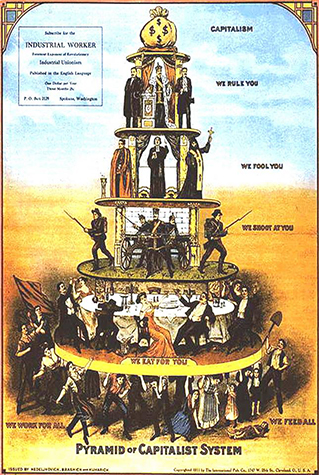by George Stinney, Jr.
November 23, 2015
With Bernie Sanders running for president as a self-described socialist, it’s a good moment to talk about what the socialist vision looks like. Here is a general overview from a veteran of the socialist movement.
Human Needs Come First
Socialism means that the 99% would be setting society’s priorities, instead of the corporate elite. Like the formal guarantees of freedom of speech and association in the Constitution, serving human needs would become a bedrock principle. Instead of pitting part of the population against another section for what the 1% determine is available for human needs, the agenda would begin by reversing the inequality that capitalism breeds.
Justice is at the Foundation of Socialism

A 1911 illustration from Industrial Worker.
No wealth is created without workers. Even the most bizarre business (other than a complete ponzi scheme rip-off) has at bottom some real tangible item or service. That item or service at some point has to be handled, made, or delivered by human beings. Diamonds and gold only have potential value in the ground. The true “worth” of even the most valuable precious metals and stones can only be had with human labor.
Henry Ford’s ideas about mass production and the assembly line would have meant nothing without millions of workers to make the ideas real. Socialists contend that workers who generate such wealth deserve more than pay and benefits. Workers deserve to plan how wealth-generating industries are run, to control the wealth they create. That is the only way society’s needs will be met.
Imagine a politician saying: I have great ideas for this city. I know how it should be run, where it should be, the services it will offer, etc. Then that person says she will pay people to populate the city–as long as they sacrifice their liberty and do everything what she says. That is essentially what happens with private firms. People are paid to be dictated to, although in fact the company wouldn’t exist without them and there would be no profit. Instead, just as a Mayor or other elected officials are supposed to serve residents, work places should serve the workers as part of a society that puts human need first.
It’s true that replacing capitalism’s bottom line of profitability at all cost with a program for universal health care, education, decent housing, the right to work and the sustainability of our environment would take the energy of all of us. But the economic democracy that is the heart of socialism upends inequality by replacing institutions that narrow human potential—such as those that have historically condemned Native Americans and African Americans to poverty and exclusion, and perpetuated gender stereotypes that restrict women to the role of caregivers.
Socialism doesn’t automatically cure the plagues of racism and sexism–or environmental collapse, for that matter. It opens up the possibility to do so, because it gets rid of a system of capitalist production and accumulation that requires and rewards the most exploitative, oppressive, and destructive behaviors.
In sweeping away these constricting institutions and stereotypes, we need new forms of organization that can set priorities, encourage innovation and carry out programs that reflect our priorities. To do this we need both community-based and work-based organizing. That is, socialism is both a social and economic system where human beings are able to flourish because the infrastructure encourages their development, and where people are politically involved in nourishing continued economic and cultural development.
We are far from that today!
Talking Socialism
The fact that Bernie Sanders is running for president–speaking out in support of an economic agenda for the 99%, and saying that he’s a socialist–has excited thousands who turn out at his rallies. “So what democratic socialism means to me,” he said, “is having a government which represents all people, rather than just the wealthiest people, which is most often the case right now in this country. And it is making sure that all of our people have health care as a right, education as a right, decent housing as a right, child care as a right. That’s what I believe.”
The idea that a presidential candidate says that all people should have a decent standard of living is a big step forward, even if he’s talking only about program, not how to make it happen.
Our electoral system is designed to benefit the 1% while having a democratic veneer. But the last successful third party was the anti-slavery Republican Party, 150 years ago! When socialists began to win political office 100 years ago, states tightened up their requirements. While the Voting Rights Act of 1965 opened up voting rights for African Americans, restrictive state laws today are reversing that reality. Today, too, it’s the billionaires who buy the elections. Candidates are beholden to the likes of the Koch Brothers.
Bernie Sanders is shaking up the primary season. But he’s announced that if he loses the Democratic Party presidential nomination, he will support the nominee, probably Hillary Clinton—the corporate Democrat who has served on the board of Walmart, opposed a universal health care plan, and carried out an imperialist agenda as Secretary of State.
Where can Bernie’s supporters go after Hillary or another corporate politician wins the Democratic primary? While some will end up holding their noses and vote for the Democratic ticket as “the lesser evil,” we hope that many will continue the quest for a different kind of politics. There will be working-class candidates running for local, non-partisan offices, there will be important ballot initiatives, there will be Green Party campaigns. These will be worth supporting as we continue the fight for a society where the 99% can set the agenda–a socialist society that’s worth working for.
This statement was written for Solidarity by a long time member, a cultural worker and activist, who asked to publish under a pen name.
